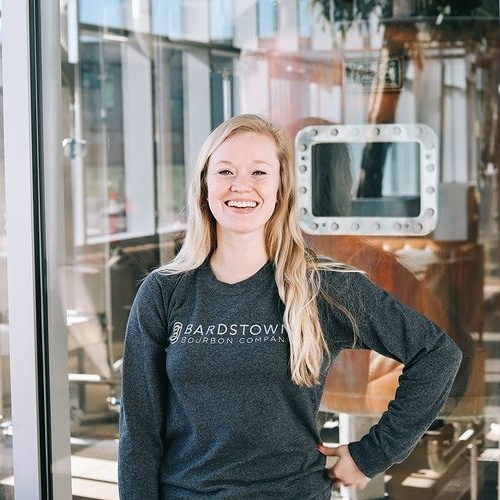Can a childhood passion for forensic chemistry lead to a career in the Bourbon industry? That’s exactly how it happened for Bardstown Bourbon Company Quality Control Chemist Meghan Mattingly!
BW: How did you first become interested in chemistry?
MM: Becoming interested in chemistry was a little different for me. I grew up obsessed with Criminal Minds. I always told my parents that when I grew up, I wanted to be a profiler because I was smarter than them. I was fortunate enough my high school offered forensic classes, so I started with taking those. Once it was time to decide what I wanted to major in in college and where I wanted to go, I discovered forensic chemistry. I had always been interested in chemistry. When my parents moved out of our childhood house, they found an “About Me” book we had made in the second grade and when it was asked what I wanted to be when I grew up, I drew a picture of me as a chemist. I graduated high school and went to Eastern Kentucky University. I graduated from there with a degree in Forensic Chemistry. My way into the bourbon world was a little nontraditional.
BW: You worked on setting up the chemistry equipment at Bardstown Bourbon Co. What was that process like?
MM: It has been an exciting process setting up the instruments in the lab. My work from the previous lab I was with helped tremendously with being able to help set these up. I was able to work very closely with my boss, Travis, to help set up the methods that we run. The two of us were able to get our gas chromatography (GC) up and running, even with the craziness the year 2020 brought us. Developing the lab is an ongoing process, which entails continuous method development to expand on what we test for. (Also check out Elmer Lucille Allen‘s story of setting up modern equipment at Brown-Forman when chemistry went from wet to computerized back in the 1960s.)
BW: What kinds of things are you looking for in your analyses?
MM: With the current methods we run, there are a few things that we as a quality team look for. Every fermenter that we drop, at the end of our 72-hour fermentation, gets ran on the High-Performance Liquid Chromatography (HPLC). We use the HPLC to test for ethanol percent, as well as sugars to ensure good conversion and acids. All the distillate lots that we produce get ran on the GC. We monitor different fusel oils that can be a byproduct of fermentation and distillation. Certain fusel oils can change the flavor profile of the distillate, so that is monitored and allows us to make changes in the process. I am in the process of creating new methods to test for different flavors and congeners in aged whiskey, so stay tuned…
BW: What advice do you have for women who want to be distillery chemists?
MM: Advice that I have for any woman, whether they want to become a distillery chemist or a woman in science, is to work hard and learn anything and everything you can. Take the initiative to learn as much about the process as a whole and where the quality of the product comes into play. Having the knowledge and drive will get you a long way. No job is below you when you are learning. Ask the question, whether you think it’s silly or not, people loved to be asked about their jobs and what they do.
BW: Tell me about your perfect whiskey weekend in Bardstown.
MM: A perfect whiskey weekend in Bardstown for me would be sitting on my back porch, with some friends and a glass of bourbon on the rocks, listening to music and chatting about life. If I were to go out for a drink, Bardstown Bourbon’s patio in the summertime is the perfect place to hang out and relax.
Photo Courtesy of Bardstown Bourbon Co


Awesome interview, Meghan.
It was such a pleasure having you at the lab in Alpharetta for training. Your enthusiasm for learning is palpable and so refreshing.
Really inspiring interview- I love hearing about women in science. Congratulations on all your success, Meghan, and I can’t wait to see the new methods you are creating.